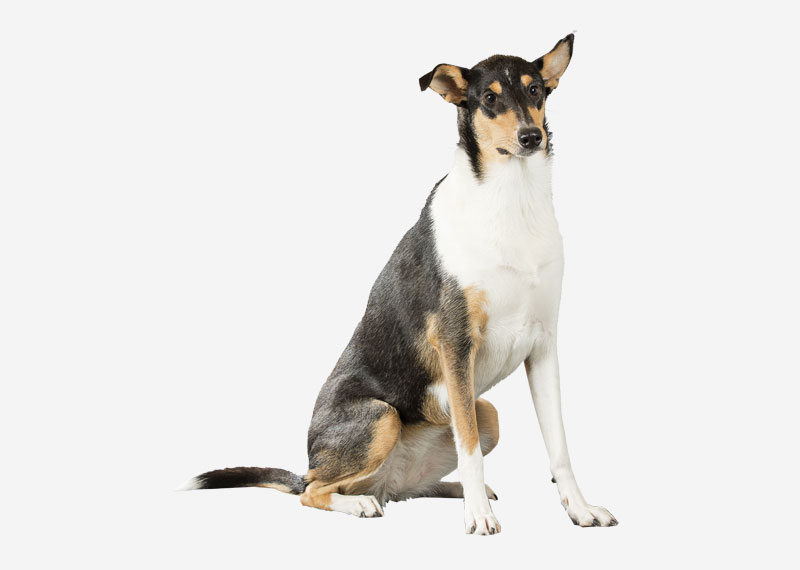The Smooth Collie is a breed of dog developed originally for herding. It is a short-coated version of the Rough Collie of Lassie fame. Some breed organisations consider the smooth-coat and rough-coat dogs to be variations of the same breed.
History
The early history of the Smooth Collie, like that of many dog breeds, is largely a matter of speculation. The most common view of the breed is that they are descended from a population of shepherds' dogs brought to Scotland by the Romans around the 5th century. Even the origin of the breed's name is unclear, variously claimed to describe the early shepherd dog's dark colour ("coaly"), or derived from the name of a breed of sheep with black faces once commonly kept in Scotland ("Colley"), or derived from an Anglo-Saxon word meaning "useful." The word could also trace to Gaelic or/and Irish - in which the words for "doggie" are, respectively, càilean and cóilean. This would be more consistent with the breed's origin in the Gaelic-speaking Scottish Highlands than an Anglo-Saxon term.
The modern history of both the Smooth and Rough Collie began in the reign of Queen Victoria, who became interested in the shepherds' dogs while at Balmoral Castle in Scotland. In 1860, she purchased some of the dogs for her own kennel. With the Queen's interest, it became fashionable to own Smooth Collies. Thus began the breed's transformation from working farm dog, similar to the modern Border collie, to the dog bred as a pet and for the sport of conformation showing that we know today.
The Smooth Collie today is considered a variety of the same breed as the Rough Collie in the United States, meaning that they can interbreed and some statistics are kept only for "Collie" rather than for both varieties individually. The smooth and rough are classified as separate breeds in other countries, such as the United Kingdom, Canada, and Australia. The latter is a fairly recent development, however, with the Kennel Club (UK) allowing the interbreeding of the two varieties until 1993.
Health
The Smooth Collie is a long-lived breed for its size, usually living 12 to 14 years. Like all dog breeds, they are susceptible to certain inherited or partially inherited health problems. Those problems currently include:
- Collie eye anomaly (CEA): A collection of eye problems ranging from minor blood vessel abnormalities to blind spots to severely deformed or detached retinas. This problem is so widespread in collies that completely unaffected dogs (called "normal eyed") are uncommon, although conscientious breeders have been able to gradually increase the normal population. The problem and its extent can be determined through an eye exam conducted before six weeks of age, and does not get worse over time. Mildly affected dogs suffer no impairments, and are fine pets or working dogs.
- Progressive retinal atrophy: Gradual degeneration of the retinas of the eyes, eventually leading to blindness. This disease is less common than CEA in Collies, but more difficult to breed away from, as symptoms are not usually detectable until the affected dog is middle-aged or older.
- Multidrug sensitivity: Sometimes fatal reactions to a class of common drugs, particularly ivermectin, used as a heartworm preventative and treatment for mites. The gene that causes this sensitivity has recently been identified, and a dog's susceptibility can now be determined through a simple blood test.
- Gastric torsion ("Bloat"): A painful and often fatal twisting of the stomach occurring in large or deep-chested breeds. Bloat can usually be prevented by feeding small meals and not allowing vigorous exercise immediately before or after eating.
- Epilepsy: Seizures of unknown origin. Frequency of the seizures can often be significantly reduced through medication, but there is no cure for this disease.




